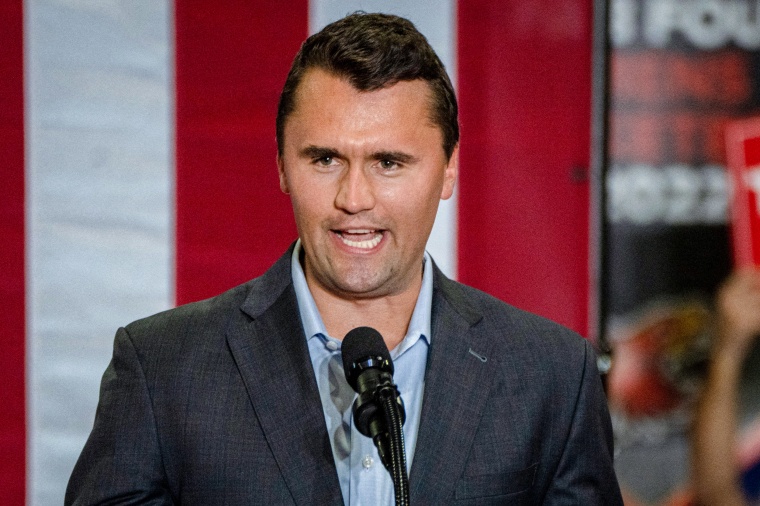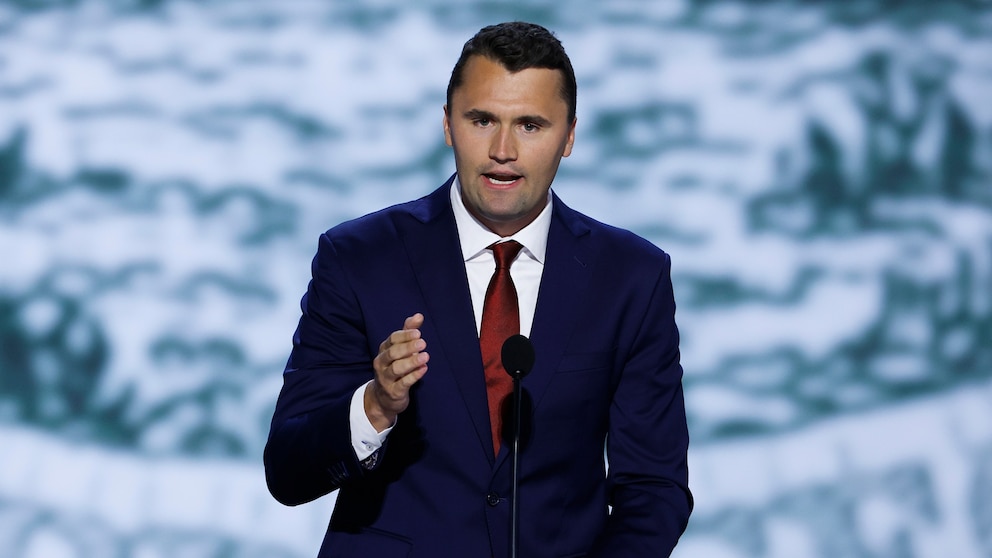When George Strait speaks, people listen. For over five decades, the man known as the King of Country Music has built his reputation not just on his voice, but on his integrity — the steady kind of decency that feels rare in an age of noise and outrage.
But this week, that integrity was tested like never before.
In a moment that has sent ripples through the entertainment world and beyond, George Strait made a bold, uncompromising decision: to permanently ban a member of his touring crew after discovering that they were the same Chicago elementary teacher who mocked the assassination of Charlie Kirk during a public rally.
The gesture — a crude imitation of firing a gun, captured in a now-viral video — drew widespread condemnation online. But when Strait learned that the individual responsible was part of his own professional circle, he didn’t hesitate.
“Neither this individual nor their family will ever be allowed near my shows again,” Strait reportedly told his management team.
The words were simple. The message, unmistakable.

A Viral Clip That Shook the Internet
It started like so many scandals do these days — with a clip posted on social media.
The footage, recorded at the No Kings Rally in Chicago, showed a woman — later identified as an elementary school teacher — making a mock gun gesture while referencing the assassination of Charlie Kirk, the conservative commentator and founder of Turning Point USA.
The moment was met with outrage across the political spectrum. “This is who we entrust our children to,” one viral post read, “and then we wonder why they become radicalized as adults.”
Within hours, the video had been shared millions of times. Parents called for disciplinary action. Commentators debated what it said about civility in public life.
But behind the headlines, a far more personal shock was waiting to unfold.
When the Truth Hit Home

As the story gained traction, George Strait’s longtime manager reportedly received a phone call that changed everything. The teacher at the center of the scandal wasn’t just a stranger from the news — she had been working as part of Strait’s touring group for several months.
Her role was minor, one of dozens helping manage logistics and backstage operations during his current U.S. tour. Still, the revelation stunned Strait’s camp.
“When George found out, he didn’t yell,” said one source close to the team. “He just went quiet for a long time. Then he said, ‘That’s not who we are. Not on my watch.’”
For a man known for his restraint and humility, the decision that followed was swift and absolute.
“The Line Is Respect”

Strait issued an internal memo to his entire tour staff later that day. In it, he made one point clear: decency is not negotiable.
“We live in a world where people disagree,” he wrote. “That’s fine. But mocking tragedy — that’s where the line is. The line is respect.”
The statement, later confirmed by his publicist, laid out that the individual and their immediate family members would be barred from all current and future George Strait events — indefinitely.
For many fans, the move reinforced what they already believed about the artist: that George Strait doesn’t just sing about values — he lives them.
A Legacy Built on Integrity
Over the course of his legendary career — spanning more than 60 number-one hits, three generations of fans, and an unmatched reputation for grace under pressure — George Strait has always stood apart.
Unlike many celebrities, he’s avoided scandal. He doesn’t wade into online arguments or public feuds. His life, much like his music, is defined by simplicity, respect, and quiet strength.
That’s what makes this moment so striking.
“George isn’t political,” said a Nashville insider. “He’s about principle. If you work for him, you’re part of his family — and that means treating people with dignity, no matter who they are.”
“Mockery Isn’t Freedom”
In a brief public statement following the ban, Strait didn’t mince words.
“This isn’t about politics or freedom of speech,” he said. “It’s about decency. Freedom doesn’t mean cruelty. Mockery isn’t courage — and it sure isn’t country.”
The phrase — “Mockery isn’t courage” — quickly began trending online, resonating with fans across all backgrounds.
It was a message rooted in the same values that have defined his career: faith, compassion, and respect for others.
Country radio hosts called his stand “vintage Strait” — calm, classy, and uncompromising.
“He didn’t shout. He didn’t grandstand,” said one station DJ. “He just told the truth and moved on. That’s why people love him.”
Fans Rally Behind “The King”
Online, the reaction was immediate — and overwhelmingly supportive.

“George Strait just reminded the world what integrity looks like,” one fan posted.
“He didn’t have to say much. Just action — pure and simple.”
Others pointed out how rare it is, in modern entertainment, to see a public figure take such a stand without turning it into spectacle.
“He didn’t make it about politics. He made it about people,” said another commenter. “And that’s the difference between being famous and being respected.”
Within 24 hours, the hashtag #NoExcusesForCruelty — inspired by Strait’s statement — was trending nationwide.
Behind the Curtain: A Quiet Code
Those who have worked with Strait over the years say this kind of decision didn’t surprise them.
“George runs his tours like a family,” said a former road crew member. “You show up, you work hard, and you treat everyone — fans, staff, strangers — with kindness. He’s never tolerated anything less.”
His code of conduct, though unwritten, is well known in Nashville. Stories abound of him stepping in quietly to pay hospital bills for crew members, visiting sick fans in secret, and mentoring young artists behind the scenes — never for attention, always for the right reasons.
“He leads by example,” said country singer Chris Young. “He’s one of the last true gentlemen in the business.”
A Stand That Transcends Music
Strait’s decision comes at a time when the entertainment industry faces mounting criticism for hypocrisy — where artists talk about values but rarely live them.
By taking decisive action, the country icon has reignited a conversation about accountability, empathy, and leadership in an age of outrage.
“George Strait didn’t cancel anyone,” wrote one editorialist. “He simply drew a line — between decency and disgrace. That’s not cancel culture. That’s character.”
Indeed, Strait’s message wasn’t about punishment — it was about principle. A refusal to normalize cruelty, especially when it mocks death or pain.
“You can disagree with anyone,” Strait said in a follow-up interview. “But you don’t laugh at loss. You don’t mock tragedy. That’s not freedom — that’s failure.”
The King Still Leads
In the weeks following the announcement, Strait has continued his U.S. tour to sold-out arenas. Audiences have greeted him with renewed admiration, often chanting his name between songs — not for a hit single, but for his stand.
He doesn’t address the controversy from the stage. He doesn’t need to.
Instead, he lets the music do what it’s always done — remind people of who they are, and who they could be.
As one fan put it after a concert in Dallas:
“George Strait didn’t just sing us songs. He showed us how to live with decency — even when the world forgets what that means.”
“No Excuses. No Cruelty.”
For George Strait, the incident will likely fade — but the message won’t.
He’s proven, once again, that leadership isn’t about volume. It’s about values.
And in an age when outrage often drowns out truth, the King of Country still stands quietly tall — reminding the world that dignity never goes out of style.
“You don’t have to shout to stand for something,” he said in closing. “You just have to mean it.”

